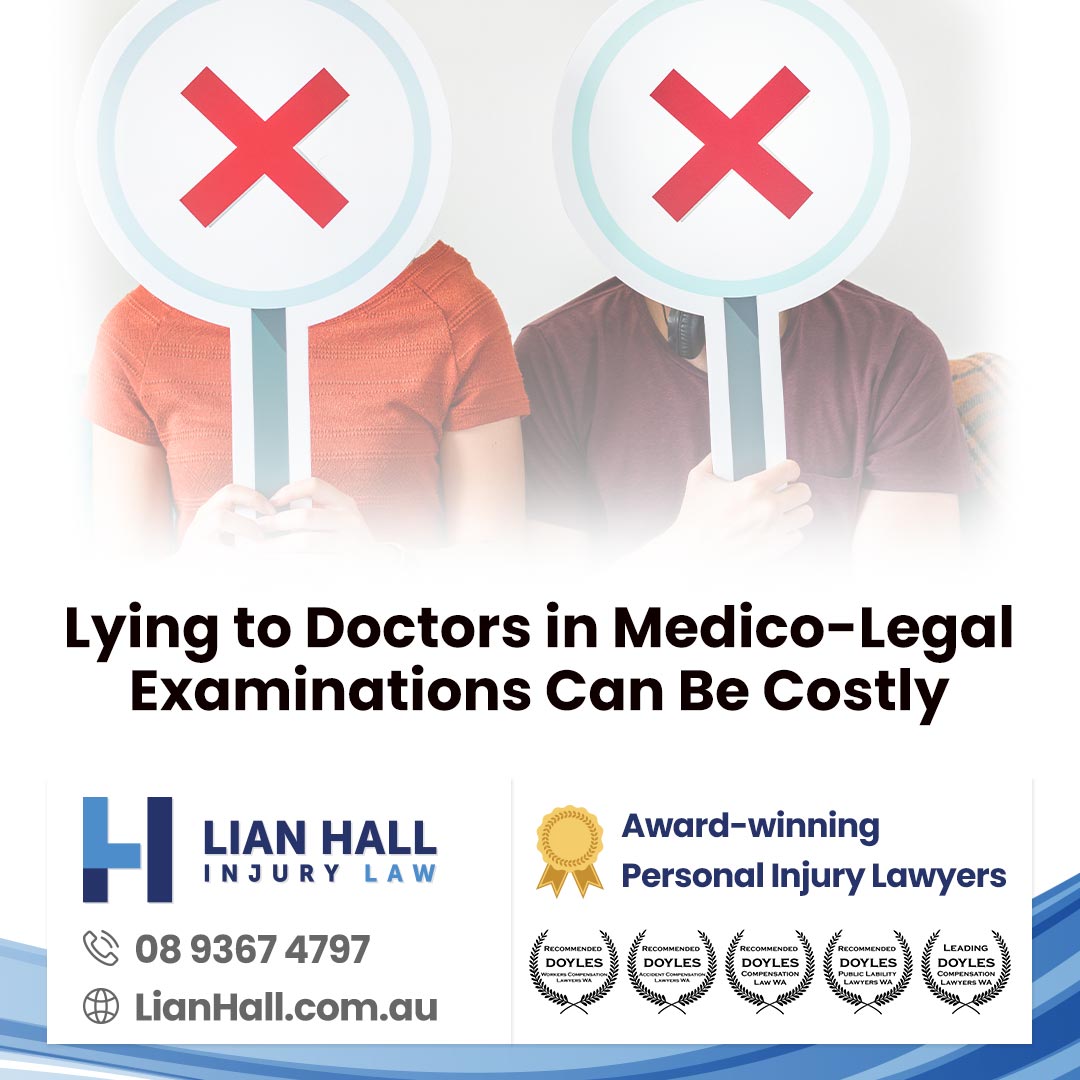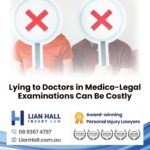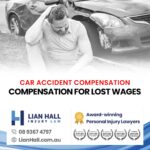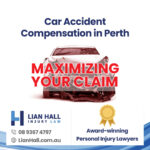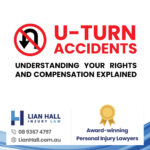When filing a compensation claim after an accident, the information you provide to doctors is crucial. The insurance company relies on the medical report generated from your examination to make decisions about your claim. If you choose to exaggerate or mislead the doctor about your injuries, you risk losing your compensation and facing significant legal repercussions. This blog explores a recent case that highlights why honesty is essential in medico-legal examinations and the potential consequences of lying to doctors.
Medico legal examinations: the importance of telling the truth.
Lying to doctors in compensation claims can have severe consequences. When making a compensation claim for injuries suffered in a car accident, it is almost certain that The Insurance Commission of Western Australia will arrange for you to be examined by a doctor to obtain an independent opinion about your injuries. At the medical examination the doctor will ask you about the accident and about your symptoms and the effect of the injuries on your life and work. The doctor will rely on what you tell them as the basis for their opinion. They will put down their opinion in a medical report and send the report to the insurance company. The insurance company will rely on the report to make decisions about your compensation claim. If a claimant chooses to knowingly exaggerate or mislead a doctor during compensation claims, this can lead to significant consequences. Lying to doctors in compensation claims may result in incorrect medical opinions and ultimately cause the insurance company to make incorrect decisions. Therefore what you tell the doctor at the examination is very important.
To understand more about the legal implications of misleading information during compensation claims, visit the Australian Government’s website on fraud and deceit.
Knowingly misleading or exaggerating your symptoms
In a recent NSW case (Allianz Australia Insurance Limited v Yu February 2024) the claimant was in a car accident and claimed compensation. He said that he had suffered a serious psychological injury that affected his motivation, his mood, his ability to follow complex instructions, drive, capacity to manage his financial affairs and his ability to work and socialise. The insurance company sent the claimant to a psychiatrist and the psychiatrist, based on what the claimant told him, diagnosed a serious injury. The psychiatrist reported that the car accident had caused cognitive impairment and depression that was dysfunctional. The insurance company relied on the report and paid $750,000 to the claimant as compensation.
Sometime later the claimant’s wife made her own claim for compensation. During the course of her claim it became clear that contrary to what her husband had been telling doctors:
- He had been able to manage his own complex financial affairs;
- He had been able to manage complicated renovations to his house;
- He did not have work restrictions, in fact he had been working as a teacher;
- He had applied for a bank loan and on the loan application he had certified that he had been working;
- He had been able to manage his own personal care, was not reclusive, and was socially engaged.
Based on what they saw in his wife’s claim the insurance company complained that the claimant had made false and misleading statements to the doctors during his compensation claim with the sole goal of getting a financial benefit. The Insurance Company made an application to the Supreme Court to order the claimant to pay back the compensation.
How did the claimant defend the claim
The claimant argued that he had not knowingly and willingly made false statements to the doctors. He argued that:
- He had not fully understood the purpose of the medico-legal examination.
- He did not fully appreciate at the time that the insurance company would rely on what he was telling the doctors.
- English was not his first language and he argued that interpreter had not properly communicated his answers.
What did the Court decide
The Claimant and his wife were heavily cross-examined at Court. In the end, the Court rejected their evidence, highlighting the importance of honesty in compensation claims. Lying to doctors in compensation claims not only jeopardises your case but can also lead to severe legal repercussions. The Court also heard from a number of other witnesses, including the contractor who the claimant engaged to renovate his house, doctors and employers and lawyers. In the end the Court rejected all of the Claimant’s explanations and said that the Claimant had knowingly made deceptive statements to the doctor with the aim of getting paid a higher amount by the insurance company. The Court said that the Claimant had a good understanding of English and was smart enough to know what was going on when he attended the medical appointment. The Court said that:
- The Claimant had committed the Tort of Deceit; and
- The Claimant had breached the statutory provisions under the NSW Third Party Claims legislation in regard to fraud.
The Court said that the Insurance Company had clearly relied on the doctor’s report when assessing his claim and had thereby relied on the claimant’s misleading statements. The Court ordered the Claimant to repay the insurance company:
- $670,000, being the difference between what they had paid ($750,000) and what his claim was actually worth had he told the truth; and
- $200,000 in interest; and
- $230,000 in legal costs.
Lessons
The Claimant knowingly exaggerated his symptoms when talking to the doctor. Ultimately that led to the Claimant being put through a lengthy and expensive and damaging Supreme Court trial where he was cross examined and he lost his compensation. Some of the lessons are:
- When you go to a doctor’s appointment where you know that the doctor is being asked to give an opinion on your injuries, tell the truth. Do not mislead the doctor about the extent of your symptoms and the effect of the injuries on your life. Do not lie. Do not exaggerate. Be frank and forthright.
- It is possible that an insurance company will dig deeper than just what you told the doctor. In this case the insurance company led evidence from the claimant’s wife, business associates, contractors, doctors, lawyers etc. They left no stone unturned to prove that the Claimant had misled the doctor.
- It is unlikely that an insurance company could reverse a compensation payment on a mere suspicion that a claimant knowingly exaggerated their symptoms at a medical examination. But if objective evidence surfaces that shows that in fact a claimant has exaggerated their symptoms, then it is possible that the insurance company will take matters further. That could have devastating effects on the claim or any settlement.
- This case shows the significant risks involved when lying to doctors in compensation claims. The insurance company pursued legal action against Mr Yu in tort, resulting in substantial financial and legal consequences.. It did not solely rely on proving fraud under the Third Party legislation.
Why Choose Lian Hall Injury Law for Your Car Accident Claim in Perth?
Injured in a car accident in Perth? Lian Hall Injury Law is here to help. With extensive experience in personal injury claims, we know how to secure the compensation you deserve. Our team thoroughly investigates your case, gathering evidence and consulting with experts to build a strong claim.
Why Lian Hall Injury Law?
- Expertise: Skilled in Perth car accident claims.
- Personalised Service: Tailored legal advice and support.
- No Win, No Fee: You pay nothing unless we win.
Contact us today for a free, no-obligation consultation and let us help you get the compensation you deserve.
Read More:
- Car Accident Compensation Claims Guide: Mistakes That You Can Make
- Whiplash Injury: Causes, Symptoms, and Legal Entitlements
- Personal Injury Lawyer Perth: Medical Examinations, Can You Put Conditions On The Doctor’s Examination?
- Injury Compensation Claims: The Importance of Medical Notes
- Can Facebook Posts Be Used In Your Injury Claim?

